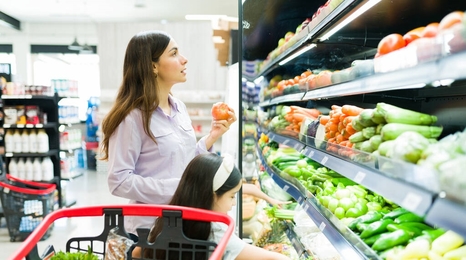The Expanded Food and Nutrition Education Program (EFNEP) is a United States Department of Agriculture funded program that successfully addresses critical societal concerns by employing peer educators. EFNEP positively influences nutrition and physical activity behaviors of low-income caregivers of children, and of youth attending schools with the highest free and reduced lunch rates.
EFNEP health and wellness coordinators deliver a series of hands-on, interactive lessons to low-income families. Lessons are evidence-based and tailored to the needs of the audience. This education helps families develop skills, attitudes, and behaviors necessary to maintain a healthy diet and stay physically active.
In Minnesota, EFNEP is administered through the University of Minnesota Extension Department of Family, Health and Wellbeing.
How does EFNEP work at the University of Minnesota?
University of Minnesota’s EFNEP team builds relationships with community agencies and community members to deliver practical direct education. Engaging programs are provided either one-to-one or to groups.
HWCs teach in a variety of settings, such as food shelves, schools, income-based housing complexes, and community centers. Classes are taught in a variety of languages throughout Hennepin, Ramsey, Anoka, and Dakota counties. The EFNEP health and wellness coordinators come from the neighborhoods served by this program, and have familiarity with their fellow communities which makes them thoughtful and knowledgeable peer educators.
Annual data confirms that graduates from EFNEP programs:
- Choose healthier food. 88 percent read nutrition labels and make healthier food choices.
- Eat healthier foods. 92 percent eat more fruits and vegetables — on average, 1.4 more servings per day.
- Stretch their food dollars. 83 percent take steps to better manage their food budget, such as planning meals and shopping with a grocery list.
- Handle food more safely. 66 percent are more likely to follow food safety practices, such as storing and thawing food properly.
- Increase their physical activity. 40 percent are more likely to engage in at least 30 minutes of daily physical activity.
Get more information about our EFNEP program
Partner with us to offer education to your agency’s participants: Contact EFNEP.
Get more information by contacting an EFNEP staff near you below. Not sure who to contact about a program or partnering? Use our form to be directed to the correct person: Contact Health and Nutrition.
| Name | Location | Telephone | Email Address | Languages spoken |
|---|---|---|---|---|
| Sarah Jergenson | St. Paul | 612-626-6926 | jerge053@umn.edu | English |
| Gold Lor | St. Paul | 612-626-2110 | goldlor@umn.edu | English, Hmong |
| Name | Location | Telephone | Languages spoken | |
|---|---|---|---|---|
| John Haggenmiller | Eden Prairie | 612-625-0309 | hagge142@umn.edu | English |
| Isaiah Joans | St. Paul | 612-625-0309 | joans001@umn.edu | English |
| Karen Kulus | St. Paul | 612-626-4708 | kulus@umn.edu | English |
| Roberto Martinez | Farmington | 651-480-7792 | martinep@umn.edu | English, Spanish |
| Joyce McGee-Brown | Eden Prairie | 612-596-2135 | jmcgee@umn.edu | English |
| Christine Navarro | St. Paul | 612-625-3410 | navar005@umn.edu | English |
| Jennifer Ogren | St. Paul | 612-626-6910 | ogren002@umn.edu | English |
| Gissela Reyes | St. Paul | 612-626-4395 | reyes530@umn.edu | English, Spanish |
| Tou Yang | St. Paul | 612-626-2369 | yang0743@umn.edu | English, Hmong |
United States Department of Agriculture. (n.d.). Expanded Food and Nutrition Education Program (EFNEP).
Related resource
Investments in EFNEP Pay Big Dividends, Now and in the Future — U.S. Department of Agriculture — This March 31, 2016 blog post demonstrates how EFNEP "benefits the greater society."




